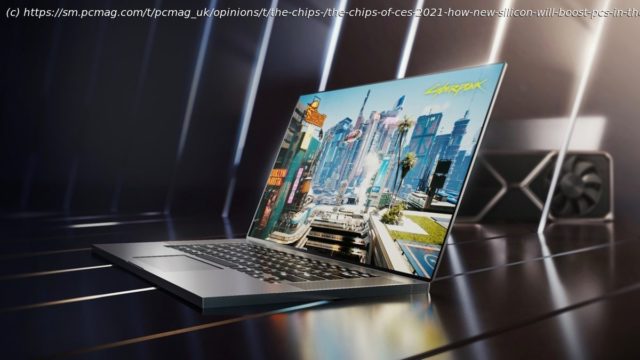AMD, Nvidia, Intel: Here’s a closer look at what all of the CES 2021 chip announcements mean for PC shoppers.
Of the scores of industries that the COVID-19 pandemic has upended, the PC industry is one of the few that looks to emerge significantly better off than it was in the « before times. » Shipments of PCs are already up significantly, transformed seemingly overnight from a stagnant technology being pushed aside by smartphones to an essential tool for an era of learning and working from home. And that era looks to be long-lasting, if not permanent. If the second personal computing revolution is going to stick, though, it needs worthy hardware. Key component manufacturers—notably, AMD, Intel, and Nvidia—have sensed this. At CES 2021 this week, they introduced dozens of new graphics processors, mobile and desktop CPUs, and other chips to boost the capabilities of PCs introduced this year. Shopping for a new laptop or desktop (or searching for parts to build one) has always been time-consuming and thick with jargon. But now that more people are doing it, it’s worth taking a closer look at what all of the CES 2021 chip announcements mean for PC shoppers this year. Laptops and Intel: A Cornucopia of New Silicon If you’re in the market for any kind of laptop, whether it’s a simple Chromebook for classwork or a beefy gaming rig, you’ll want to wrap your head around new processor families that AMD and Intel unveiled at CES 2021. Let’s start with Intel, which introduced a handful of new mobile CPUs built on the company’s long-delayed 10-nanometer (10nm) production process. It promises performance and efficiency gains to significantly speed up tasks and increase battery life. Other new chips employ older processes but bring power to high-end notebooks.’Jasper Lake’ at the Low End, and ‘Tiger Lake’ Adds vPro For Chromebook and other budget-PC shoppers, Intel unveiled new Pentium Silver and Celeron processors. Once the unexciting backwater of PC silicon, these entry-level chips are in high demand now that budget PCs are flying off the shelves for grade-school students and casual second- or third-laptop use. They’ll bring a 35% performance improvement over their predecessors, Intel claims. They will face off in Chromebooks with some new, Chromebook-specific Ryzen chips from rival AMD. (More on those in a moment.) The first of the 11th Generation (« Tiger Lake ») of mobile chips rolled out late in 2020, destined for consumer and small-business laptops. If you’re lucky enough to have your large employer send you a new business laptop to use while working remotely in 2021, know that corporate-minded 11th Gen chips are coming, too. You’ll want to see if any Intel-based machine from mid-2021 onward has one of Intel’s latest 11th Generation Core vPro processors. While 11th Generation chips have been around for a few months, at CES 2021 Intel finally introduced versions with vPro and other security and manageability features that IT departments care about. That will spur their appearance in the traditional business-laptop brands. The new chips promise 20% better overall performance than the previous generation, and an even larger improvement on work-from-home multitasking (like simultaneously videoconferencing and editing a document). ‘Tiger Lake’ H35 Series: More Power for Gamers and Creators Finally, gaming enthusiasts will want to keep their eyes on more than a dozen new laptops expected to be equipped with the latest Core H-series Tiger Lake Intel processors. The company offered a sneak peak at three of the members of the new 11th Generation H35 family this week, including the Core i7-11375H. That one is a quad-core chip with Intel’s Turbo Boost Max 3.0, which can increase the frequency of a single core to 5GHz. (Good single-core performance is important to ensuring many demanding AAA games run smoothly.) Identifying whether a laptop has one of these latest chips can be difficult, since Intel nomenclature tends to be vast and varied. The best bet is to ensure that the number « 11 » is somewhere in the chip name, which signifies that it comes from the latest (11th Generation) family. Laptops and AMD: The ‘Cezanne’ Ryzen 5000 Line Looks Like a Disrupter Plenty of laptop shoppers will want to consider AMD chips, as well, which in some cases may prove to be more capable than their Intel competitors. That looks to be the case with many of the AMD Ryzen 5000-series laptop processors that AMD unveiled at CES, which feature some gaudy core and thread counts, as well as what looks like improved power efficiency.






